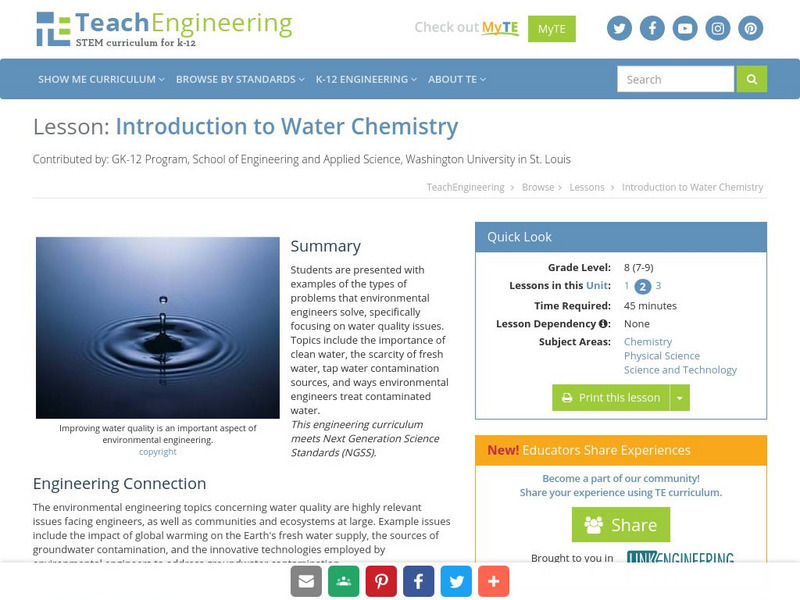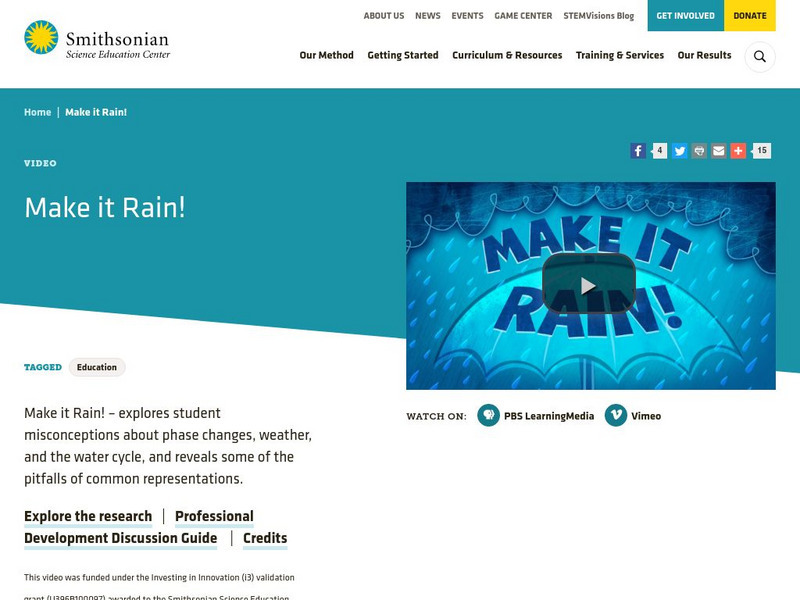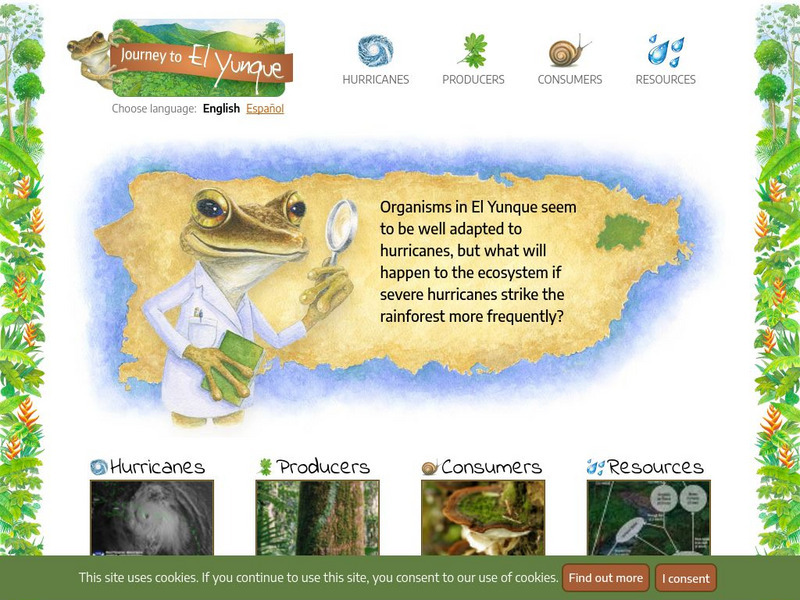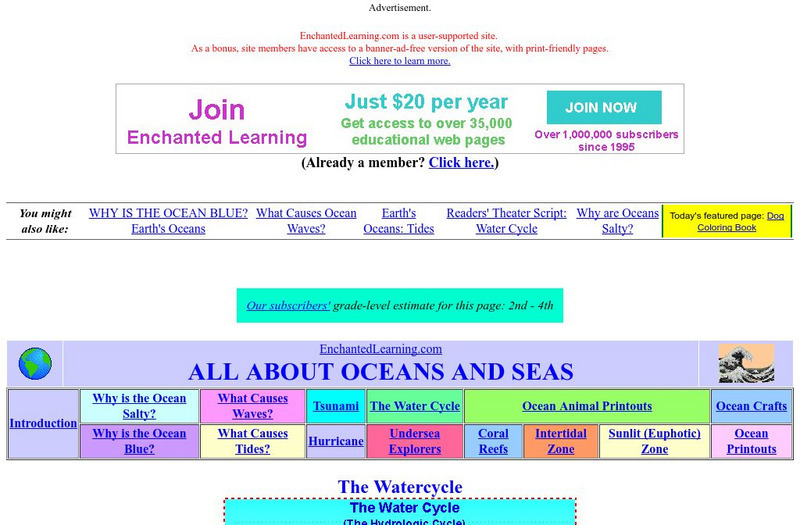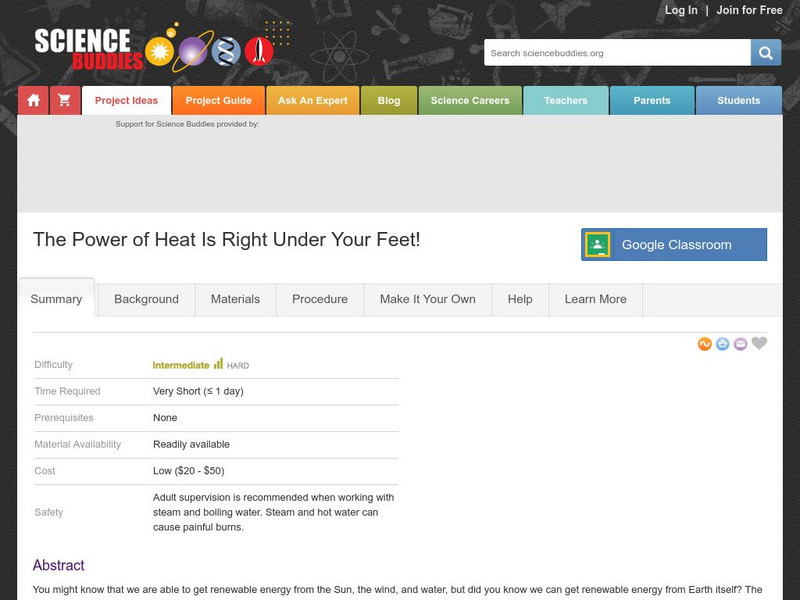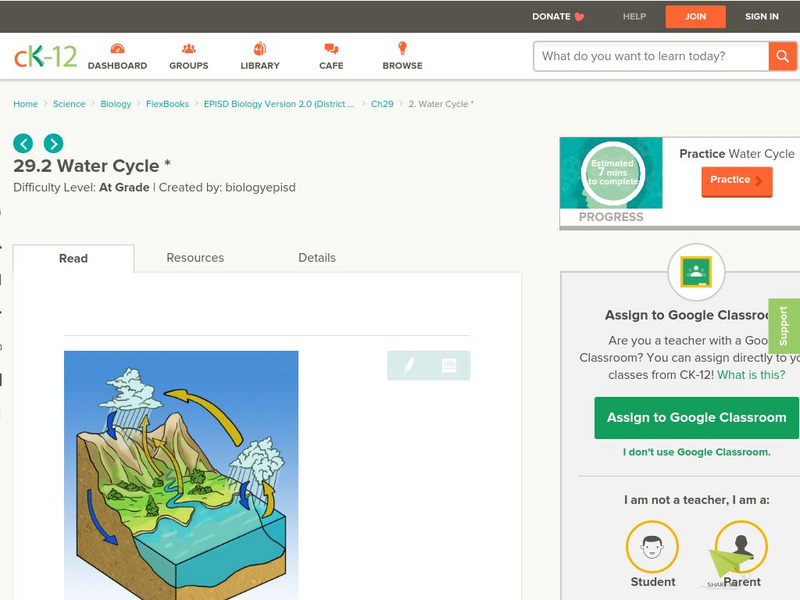TeachEngineering
Teach Engineering: Introduction to Water Chemistry
Students are presented with examples of the types of problems that environmental engineers solve, specifically focusing on water quality issues. Topics include the importance of clean water, the scarcity of fresh water, tap water...
Texas Education Agency
Texas Gateway: Exploring the Water Cycle
This tutorial includes interactive activities, videos, and teacher notes for a unit on the water cycle.
Smithsonian Institution
Smithsonian Science Education Center: Make It Rain
How do you show students that the water cycle is more than just the traditional model of the ocean, clouds, and mountains and actually a part of their daily lives? This video will show multiple models of different part of the water cycle...
NBC
Nbc Learn: Chemistry of Water
This video/lesson series explains how the structure and behavior of H2O in liquid form gives water its properties, and make it a chemical essential for life. Also in this collection: a Victorian-era depiction of the water molecule; news...
Smithsonian Institution
National Museum of Natural History: Ocean Planet
Detailed website that was a companion to a 1995 traveling exhibit of the Smithsonian. Links to lesson plans and other educational materials are at the bottom of the page. Enter the exhibition to explore the world of the ocean.
Inland Fisheries Ireland
Something Fishy: Water, Water, Everywhere
Colorful and informative site provides users with a comprehensive lesson on water. Discuss the forms of water, the water cycle, water conservation and more.
TeachEngineering
Teach Engineering: Human Water Cycle
Students learn about the human water cycle, or how humans impact the water cycle by settling down in civilizations. Specifically, they learn how people obtain, use and dispose of water. Students also learn about shortages of treated,...
US Geological Survey
U.s. Geological Survey: Water Cycle
An in-depth explanation of the Earth's water cycle, including a hyperlinked diagram that provides direct access to information about each phase in the cycle.
US Geological Survey
U.s. Geological Survey: Water Science for Schools
A collection of resources--pictures, maps, data, glossary--about water and the water cycle.
Vision Learning
Visionlearning: Earth Science: The Hydrologic Cycle: Water's Journey
Instructional module focusing on the hydrological cycle. Discussion includes the movement of water through the different reservoirs on earth and its impact on climate and weather patterns. Site also includes an interactive practice quiz...
Other
The Learning Partnership: Journey to El Yunque
In this set of learning modules, students examine the impact of hurricane weather on the El Yunque rainforest in Puerto Rico. They learn about hurricanes, producers, consumers, and the food chain, and how disruptions in organisms'...
Enchanted Learning
Enchanted Learning: The Water Cycle
Great colorful chart of the water cycle, with background information. Provides additional links for more information on the water cycle.
NASA
Nasa: Goddard Space Flight Center: Precipitation Education: The Water Cycle
This learning tool from NASA provides educational tools related to precipitation. The water cycle is featured on this portion of the site.
PBS
Pbs Learning Media: Water Cycle
Students are asked to explain how clouds participate in the water cycle. [0:32]
US Geological Survey
U.s. Geological Survey: Groundwater Information by Topic
A massive amount of information about groundwater. Topics covered include groundwater basics, humans and groundwater, groundwater quality, and its place in the water cycle. Includes true-and-false quiz and a Q&A section, as well as a...
US Geological Survey
U.s. Geological Survey: What Is the Water Cycle?
A quick summary of the water cycle that includes a diagram of the cycle, with links to in-depth explanations of each component of the cycle. Click "water-cycle home" to access water-cycle resources in a variety of languages.
Science Buddies
Science Buddies: The Power of Heat Is Right Under Your Feet!
You might know that we are able to get free energy from the Sun, the wind, and water, but we can also get free energy from Earth itself. This source of energy is called geothermal energy and it is all about taking advantage of the heat...
Other
Derm: Water Cycles and Catchments
Students develop an understanding of the water cycle and water catchments. This learning module is divided into introductory, developmental, and culminating activities, and also has several assessment strategies. Resource sheets...
Utah Education Network
Uen: Water Cycle
Activities demonstrate how the water cycle maintains itself.
CK-12 Foundation
Ck 12: Episd: Water Cycle
[Free Registration/Login may be required to access all resource tools.] An introduction to the biogeochemical cycle, the water cycle. Recognize evaporation, sublimation, and condensation. Identify groundwater and runoff water supplies.
Utah Education Network
Uen: Trb 4:1 Investigation 5 the Water Cycle Model
Demonstration helps students understand the water cycle.
Utah Education Network
Uen: Trb 4:1 Investigation 3 Condensation Chambers
Activities will help with understanding the concept of water condensation.
Utah Education Network
Uen: Water Cycle Relay Race Usu Water Cycle
Students will review the water cycle through a relay race vocabulary game.
